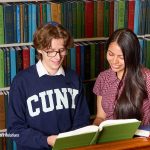The Core 100 program invites students and faculty from the College to join us for our weekly lecture series. Each week, all of the first-year students participate in lecture-discussions with about 400 of their classmates. We have space in the Center for the Arts (Building 1P) Williamson Theatre to accommodate individual guests (no permission needed) and can have as many as two additional classes at each of the lectures. Permission is not required for classes to attend, but please notify Donna Scimeca at 718.982.3405 if you plan to bring a class.
The lectures are 50 minutes and are all in the Williamson Theatre. They meet on the following days/times: Wednesdays from 12:20pm to 1:10pm; and Thursdays at 8:00am, 10:10am, 4:40pm, and 6:30pm.
Please note that in the spring, the Saturday 10:10am lectures are held in the Center for the Arts Lecture Hall, but due to space limitations, we unfortunately cannot accommodate additional classes. The Lecture Series schedule for the week of Monday, Mar. 2is as follows:
Wednesday, Mar. 4
-12:20pm: “A House Divided: On Slavery and the United States” presented by Robert Grosso.
This lecture will look at the growing divide within the United States over the issue of slavery, with a focus on the 1850s to 1861.
Robert Grosso has been teaching at the college level since March 2014, and this is his first full year teaching Core. He holds a Master’s degree in History from the College of Staten Island, and a Bachelor’s in Education from Iona College in New Rochelle, NY. Before he started teaching with the Core program, he worked as a substitute teacher and a paraprofessional for the NYC Board of Education for nearly ten years, beginning in 2005.
Thursday, Mar. 5
-8:00am: “American Slavery: Its Origins, Execution, and Legacy” presented by Annette Marks-Ellis.
This presentation will explore the reason for colonial slavery and how its evolution under the Dutch, British, and Americans became an institution that is historically associated with dehumanization, racism, and profit. Students will be shown how this “peculiar institution” left its indelible mark on the United States and its citizens. Using music and an audiovisual presentation, Professor Marks-Ellis will show students the origins of a slave culture and stereotyping as it pertains to African Americans. The legacies of this institution will also be explored.
Annette Marks-Ellis earned her undergraduate and graduate degrees at Columbia University. She has been at CSI and teaching Core 100 since 1999. She has published several articles on African American history, women’s issues, and Caribbean culture.
-10:10am and 4:40pm: “Articles of Confederation, Constitution and the Bill of Rights, and the Gideon Case” presented by Rosemary McCall.
This lecture is a continuation of last week’s lecture in which Prof. McCall will continue to focus on the development of the Constitution, in particular an examination of the Bill of Rights.
Rosemary McCall is a graduate of Brooklyn College, CUNY. She holds advanced degrees from the University of South Carolina (MS) and GWU, National Law Center (JD). This is her seventh year teaching COR at CSI.
-6:30pm: Special Event: The Core Program, in partnership with the Department of Sociology and Anthropology, will be presenting Every Mother’s Son, a documentary about police misconduct and the growing national movement for the need to reform policing. The film will be shown in the first hour (6:30pm to 7:20pm). Following the showing of the documentary, filmmaker Tami Gold, and one of the mothers profiled in the film, Iris Baez, will join Professor John (Jay) Arena, to lead the audience in a discussion (7:30pm to 8:15pm). This is a CLUE certified event.
John (Jay) Arena, Assistant Professor in the Department of Sociology and Anthropology, earned his PhD in Sociology and MA in Latin American Studies from Tulane University in New Orleans and joined the College of Staten Island’s Department of Sociology and Anthropology in fall 2008. Previous to and during graduate school, he participated in various community and labor organizing efforts in New Orleans. As a public sociologist, he has built on and maintained this commitment to social change by linking his research, writing, and teaching to the service of changing oppressive social conditions.














